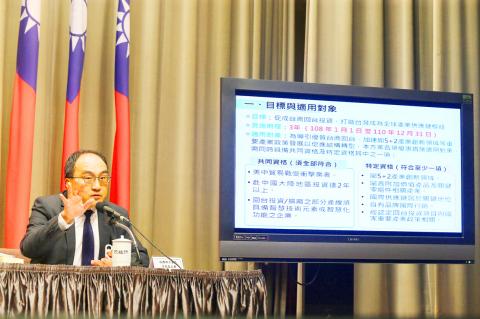The Executive Yuan yesterday approved a three-year plan to attract investment from Taiwanese businesses in China affected by the current US-China trade dispute.
The plan, which is to take effect on Jan. 1, focuses on five areas — land use, labor, tax services, water and electricity supply, and fast financing — and only businesses affected by the trade dispute, that have been investing in China for more than two years and that want to investing in production lines incorporating smart technology would be eligible, it said.
They must also be in an industry targeted by the government’s “five plus two” innovative industries plan or produce a high value-added product, it said.

Photo: CNA
Regulations for employing foreign workers would be relaxed for businesses that open new factories in Taiwan or expand existing ones to a certain size, it said.
For companies in the high-tech field, they must invest more than NT$250 million (US$8.11 million) and create 100 — or 20 percent — additional jobs for Taiwanese workers, it said.
Those in other industries would have to invest more than NT$50 million and create 50 — or 20 percent — more jobs for Taiwanese workers, it said.
Workers’ monthly salaries would need to be at least NT$30,000, it said.
Companies that meet those requirements would be eligible for an advanced allocation of their foreign worker quota, would not be subject to regular inspections of their local-to-foreign worker ratio for a year and be able to have foreign workers fill up to 40 percent of their jobs, it said.
The National Development Fund has also set aside NT$20 billion to loan to businesses returning to Taiwan under this plan, but this amount could be raised if the funding is used up before the end of the plan, the Executive Yuan said.
The government is able to provide about 435 hectares now and an additional 873 hectares would be included between next year and 2021, it said.
The Water Resources Agency and Taiwan Power Co are to help manufacturers quickly secure their water and electricity supplies, and national taxation bureaus nationwide are to provide businesses returning to Taiwan with consultation services, the Executive Yuan said.
InvesTaiwan is to be responsible for processing applications, which would be jointly reviewed — within two weeks — by different government agencies, it added.
In related news, during the question-and-answer portion of a meeting of the legislature’s Social Welfare and Environmental Hygiene Committee, Democratic Progressive Party Legislator Huang Hsiu-fang (黃秀芳) said that some people have already begun saying that relaxing the employment restrictions on foreign workers for returning overseas businesses would be unfair to local firms that already face a labor shortage.
Minister of Labor Hsu Ming-chun (許銘春) told Huang that the planned relaxation is conditional and that a sunset clause would be applied.

Taiwanese can file complaints with the Tourism Administration to report travel agencies if their activities caused termination of a person’s citizenship, Mainland Affairs Council Minister Chiu Chui-cheng (邱垂正) said yesterday, after a podcaster highlighted a case in which a person’s citizenship was canceled for receiving a single-use Chinese passport to enter Russia. The council is aware of incidents in which people who signed up through Chinese travel agencies for tours of Russia were told they could obtain Russian visas and fast-track border clearance, Chiu told reporters on the sidelines of an event in Taipei. However, the travel agencies actually applied

Japanese footwear brand Onitsuka Tiger today issued a public apology and said it has suspended an employee amid allegations that the staff member discriminated against a Vietnamese customer at its Taipei 101 store. Posting on the social media platform Threads yesterday, a user said that an employee at the store said that “those shoes are very expensive” when her friend, who is a migrant worker from Vietnam, asked for assistance. The employee then ignored her until she asked again, to which she replied: "We don't have a size 37." The post had amassed nearly 26,000 likes and 916 comments as of this

New measures aimed at making Taiwan more attractive to foreign professionals came into effect this month, the National Development Council said yesterday. Among the changes, international students at Taiwanese universities would be able to work in Taiwan without a work permit in the two years after they graduate, explainer materials provided by the council said. In addition, foreign nationals who graduated from one of the world’s top 200 universities within the past five years can also apply for a two-year open work permit. Previously, those graduates would have needed to apply for a work permit using point-based criteria or have a Taiwanese company

The Shilin District Prosecutors’ Office yesterday indicted two Taiwanese and issued a wanted notice for Pete Liu (劉作虎), founder of Shenzhen-based smartphone manufacturer OnePlus Technology Co (萬普拉斯科技), for allegedly contravening the Act Governing Relations Between the People of the Taiwan Area and the Mainland Area (臺灣地區與大陸地區人民關係條例) by poaching 70 engineers in Taiwan. Liu allegedly traveled to Taiwan at the end of 2014 and met with a Taiwanese man surnamed Lin (林) to discuss establishing a mobile software research and development (R&D) team in Taiwan, prosecutors said. Without approval from the government, Lin, following Liu’s instructions, recruited more than 70 software